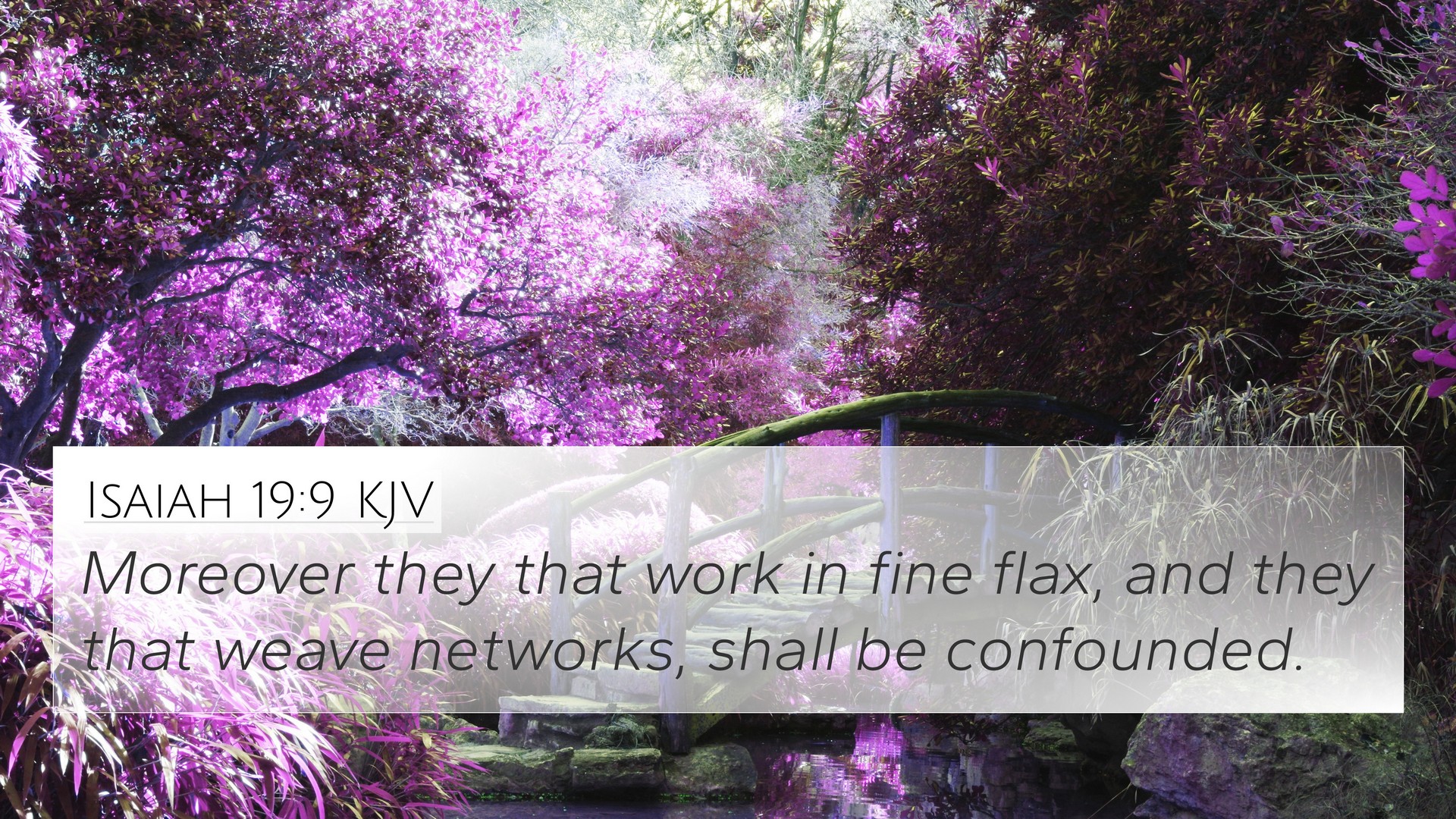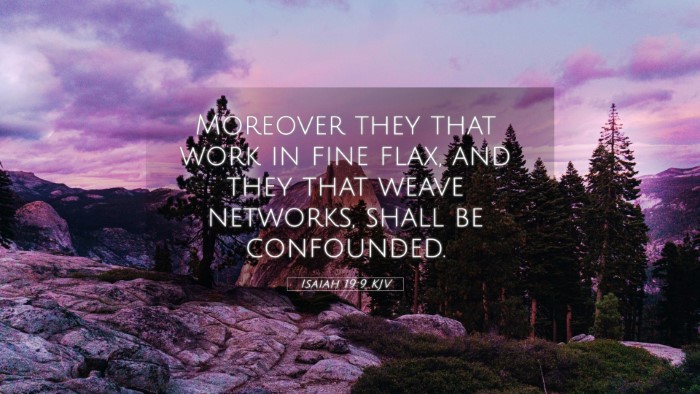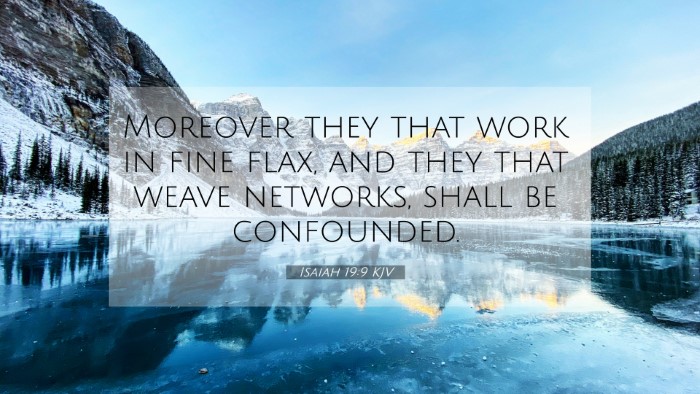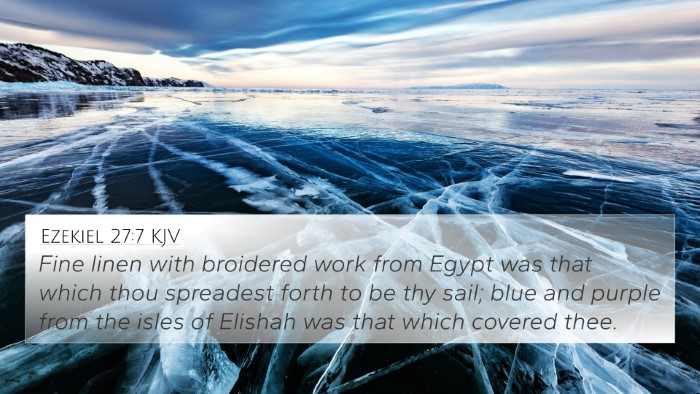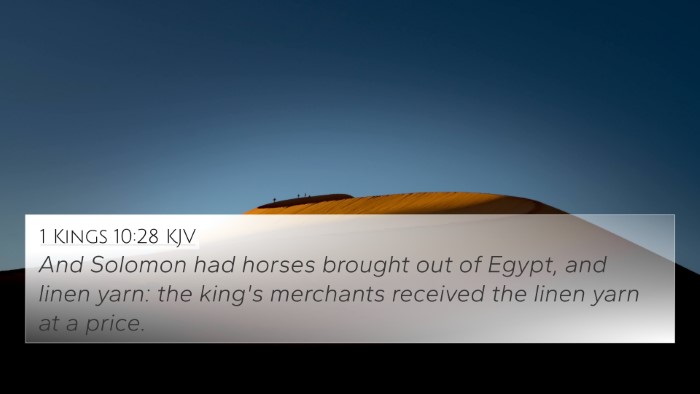Understanding Isaiah 19:9
Verse (Isaiah 19:9): "Moreover they that work in fine flax, and they that weave net works, shall be confounded."
Meaning and Interpretation
This verse highlights the futility and shame that will come upon those who depend on their crafts and trades, particularly in contexts related to Egypt. The metaphor of craftsmen working in fine flax and nets conveys a broader theme of reliance on human skill and efforts, which will ultimately lead to disappointment without divine favor.
Insights from Public Domain Commentaries
- Matthew Henry: Henry notes that the Egyptians, known for their craftsmanship, will face confusion and despair when the divine judgment falls upon them. Their skills will be rendered useless as their society crumbles due to the lack of God’s blessing.
- Albert Barnes: Barnes emphasizes the economic and social ramifications following God's judgment. He explains that the weavers and craftsmen, while seemingly secure in their trades, will realize the inadequacy of their abilities in the face of divine disfavor.
- Adam Clarke: Clarke likens the craftsmen's plight to a universal humbling. Their expertise will not protect them from the overarching influences of God’s will. He points out the historic context that underscores the importance of divine guidance in human affairs.
Thematic Connections
The themes present in Isaiah 19:9 connect with several other biblical passages that illustrate the notion of human effort versus divine influence. The following cross-references highlight similar themes:
- Psalms 127:1: "Except the LORD build the house, they labour in vain that build it." - This verse parallels the idea that human efforts without God's involvement are ultimately futile.
- Proverbs 3:5-6: "Trust in the LORD with all thine heart; and lean not unto thine own understanding." - A reminder to rely on God rather than one's own capabilities.
- Jeremiah 9:23-24: "Let not the wise man glory in his wisdom... but let him that glorieth glory in this, that he understandeth and knoweth me." - Illustrates that human wisdom is subordinate to divine knowledge.
- Isaiah 40:30-31: "Even the youths shall faint and be weary... but they that wait upon the LORD shall renew their strength." - Emphasizes that true strength comes from God rather than human ability.
- 1 Corinthians 3:19: "For the wisdom of this world is foolishness with God." - Reflects the notion that human wisdom and skill are insignificant compared to divine understanding.
- Job 5:12-13: "He disappointeth the devices of the crafty, so that their hands cannot perform their enterprise." - Highlights the futility of relying on one’s cleverness apart from God.
- Ecclesiastes 2:11: "Then I looked on all the works that my hands had wrought... and behold, all was vanity and vexation of spirit." - Acknowledges the emptiness of human endeavors without divine purpose.
Exploring Biblical Cross-References
For those interested in cross-referencing biblical texts, here are some tools and methodologies to enhance understanding:
- Bible Concordances: Useful for finding keywords and themes connected to specific verses.
- Bible Cross-Reference Guides: Create a systematic approach to finding connections between verses.
- Cross-reference Bible Study: Engaging in focused studies on related scriptures can deepen understanding.
- Comprehensive Bible Cross-Reference Materials: Collecting resources that outline connections can assist in sermon preparation and personal study.
Conclusion
In summary, Isaiah 19:9 serves as a profound reminder of the limitations of human endeavor without divine assistance. The confusion and despondence of the craftsmen symbolize a broader truth applicable across time, urging believers to lean not on their own understanding but to trust wholly in the providence of God. Through comparative Bible verse analysis and thematic exploration, one can uncover deeper meanings and applications of this scripture.
Further Study Suggestions
For those wishing to further pursue this topic, consider exploring:
- How to find cross-references in the Bible: Understanding methods to locate and apply biblical parallels.
- Identifying connections between Old and New Testament: Discovering how themes evolve and intersect.
- Interpreting Biblical themes through cross-references: Engaging in deeper theological reflection and application.
